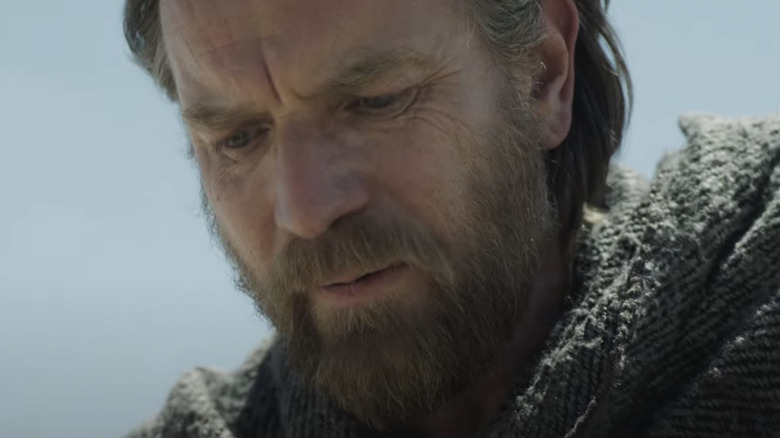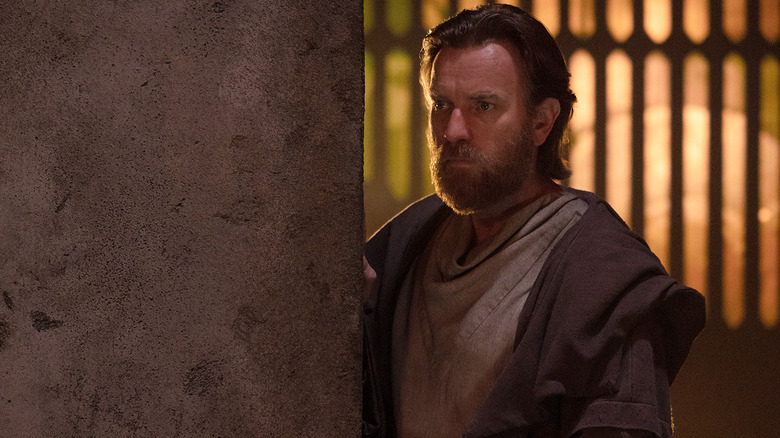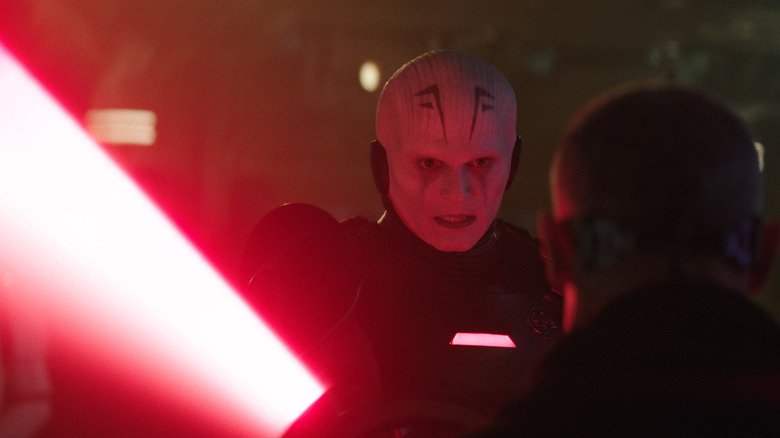The Obi-Wan Kenobi Series Looks Like It'll Explore The Failures Of The Jedi – Good
The Jedi may have the coolest weapons in the "Star Wars" galaxy, but they are one of the most corrupted, negligent, complacent orders in fiction. Their hubris led to the deaths of thousands, the end of the Jedi Order, and the rise of an evil Empire (OK, an Empire that lasted only about 30 years, but that's beside the point).
Though we knew from the very first "Star Wars" movie that Darth Vader helped hunt down all Jedi and drove them to extinction, it wasn't until the prequel trilogy that we discovered the truth: It wasn't some outside force that invaded and destroyed the Jedi, they were rotten from within. It is their greatest failure that they did not see the reckoning they were headed toward, and it is this failure that drives today's new trailer for "Obi-Wan Kenobi." Honestly, this is the first thing to make me excited for this show beyond pure nostalgia.
Hello there
The trailer opens on a very familiar and tiresome desert planet, as a slightly-older-but-still-looking-great Obi-Wan Kenobi narrates, "The fight is done. We lost," while looking very sad. In a recent interview, Ewan McGregor said the show would find Obi-Wan "rather broken, and faithless, and beaten, somewhat given up."
This makes sense, of course, given that the person who led the Jedi Purge was Obi-Wan's best friend Anakin — a character who is also set to make an appearance on this show. Obi-Wan is right to feel broken and guilty, as he was always shown to be someone who recognized the flaws of the Jedi, but continued to support and believed in the Order. Sure, he fought Qui-Gon Jinn for disobeying the council, but he learned to recognize that the Jedi were not always what they were meant to be. He knew and protected Anakin's relationship with Padmé, he defended Ahsoka, he criticized the Clone Wars, and he recognized the part the Jedi played in every conflict.
The best thing "Obi-Wan Kenobi" can do, the best thing the trailer does, is to remind audiences that the Jedi failed. They failed to see the danger in taking kids away from their parents, they failed to see why a group of warrior monks becoming army generals at the behest of politicians was a terrible idea, and they failed to see that the government was led by a Sith Lord.
It is easy to see why not everyone was on board with the way the prequel trilogy portrayed the Jedi. To go from cool warrior monks to corrupted bureaucrats that sat around in board rooms all day while waiting for the government to grant them a permit to do anything is no fun. For those who grew up watching "Star Wars" and idolizing the Jedi, the prequels showed that anyone can be corrupted and hubris can make anyone fall.
With just one line of narration, the trailer for "Obi-Wan Kenobi" embraces the prequel trilogy's biggest contribution to the "Star Wars" mythos — one that has had a very rocky reception and legacy.
It is time for the Jedi to end
George Lucas' decision to make an entire trilogy about the ineptitude of the Jedi changed everything about the "Star Wars" universe. It made Luke's victory all the greater, because he was someone who prioritized his friends and loved ones over the traditional, archaic rules of the Jedi Order. It also made the fall of Anakin more tragic.
"The Clone Wars" animated show expanded on the fall of the Jedi by focusing on smaller decisions and moments that showed why the Jedi were doomed to fail, but it was Rian Johnson's "Star Wars: The Last Jedi" that fully reckoned with the Jedi Purge. This was the first time a big piece of "Star Wars" media set post-Purge dealt with the failure of the Jedi, with Luke seeing his obsession with rebuilding the past and the failure of his Jedi academy as indicators that the Jedi should come to an end. It is a bold choice, but also the only logical step forward from Lucas' prequel trilogy, as you can't simply have Luke Skywalker trying to revive an Order that was responsible for the rise of a Sith Lord. But of course, just like "The Phantom Menace" got hatred for making the Jedi part of the bureaucratic machine, "The Last Jedi" got hatred for supposedly killing the ideal of Luke as an optimistic and cunning Jedi warrior.
It is very telling, then, that the next time we see Luke is as a younger, over-powered killing machine in "The Mandalorian," which is exactly what that subset of fans wanted but did not get from "The Last Jedi." Thankfully, "The Book of Boba Fett" did a lot to repair the damage by turning Luke into an obstinate, stubborn fanatic who is so set on bringing back the Jedi cult that he'd separate a child from his adopted father, in the same way his own father was separated from his parent. That we are seeing this same young Luke, who can go up against an army of Dark Troopers like the Jedi Knights of old, also be blind to how his actions reflect the errors of the past is very telling of the reverence (or lack thereof) that the "Star Wars" franchise is placing on the Jedi.
"Obi-Wan Kenobi" is not only being centered around a key player in the fall of the Jedi Order, but at a time when the Inquisitors are hunting down any surviving Jedi. This shows the franchise is not shying away from Lucas' portrayal of the Order, but doubling down on it. At a time when it is so easy to choose escapism and portray institutions as unbreakable and incorruptible, it is perhaps the greatest achievement of the prequel trilogy that it taught a generation of kids that to blindly trust traditions and institutions is to fall to the dark side. May "Star Wars" never forget that.


